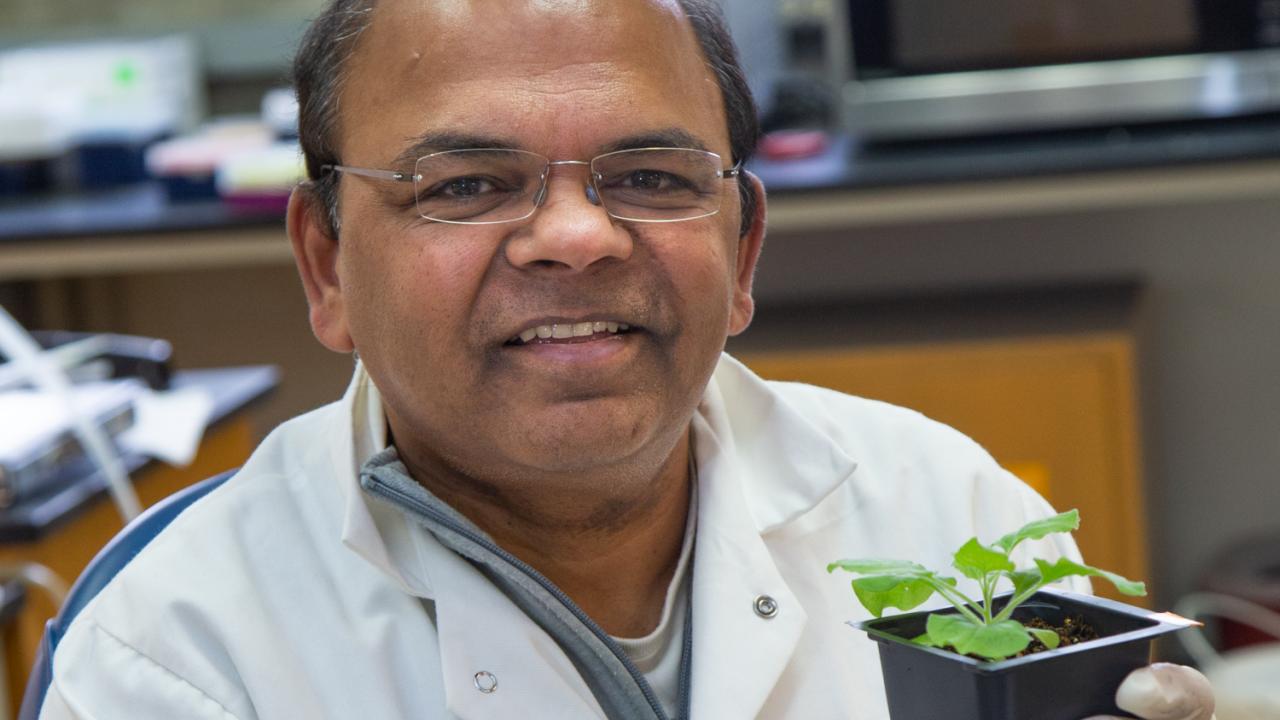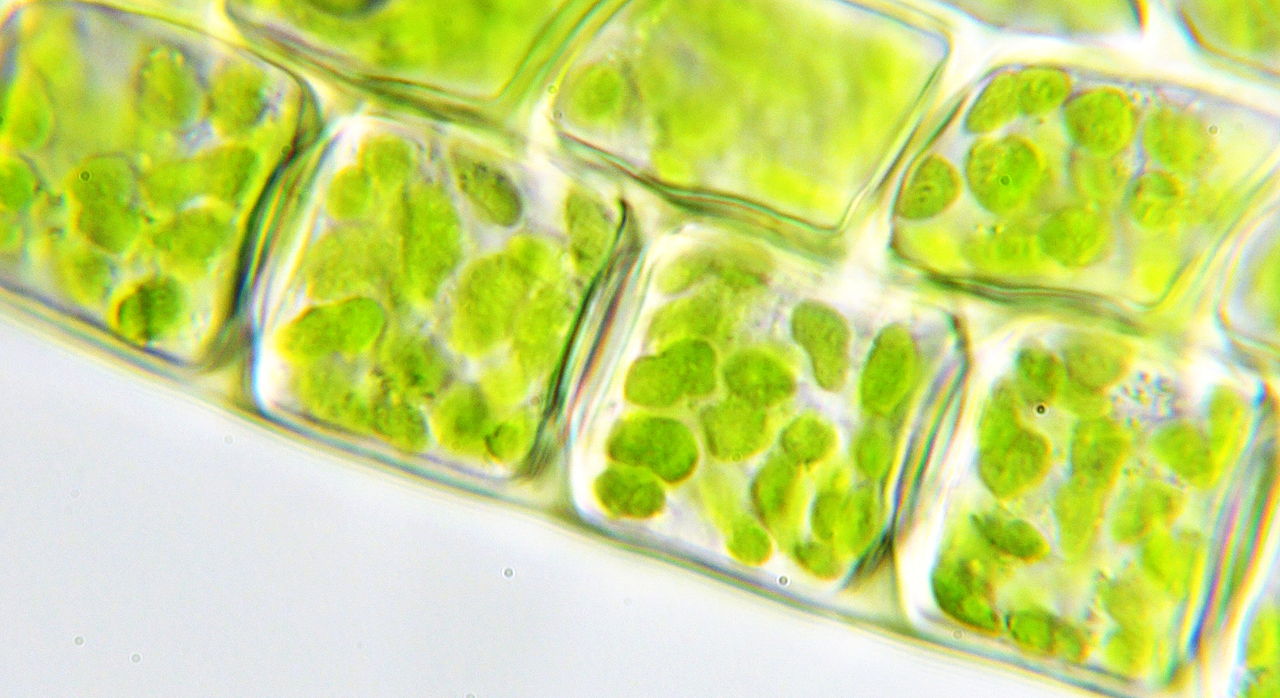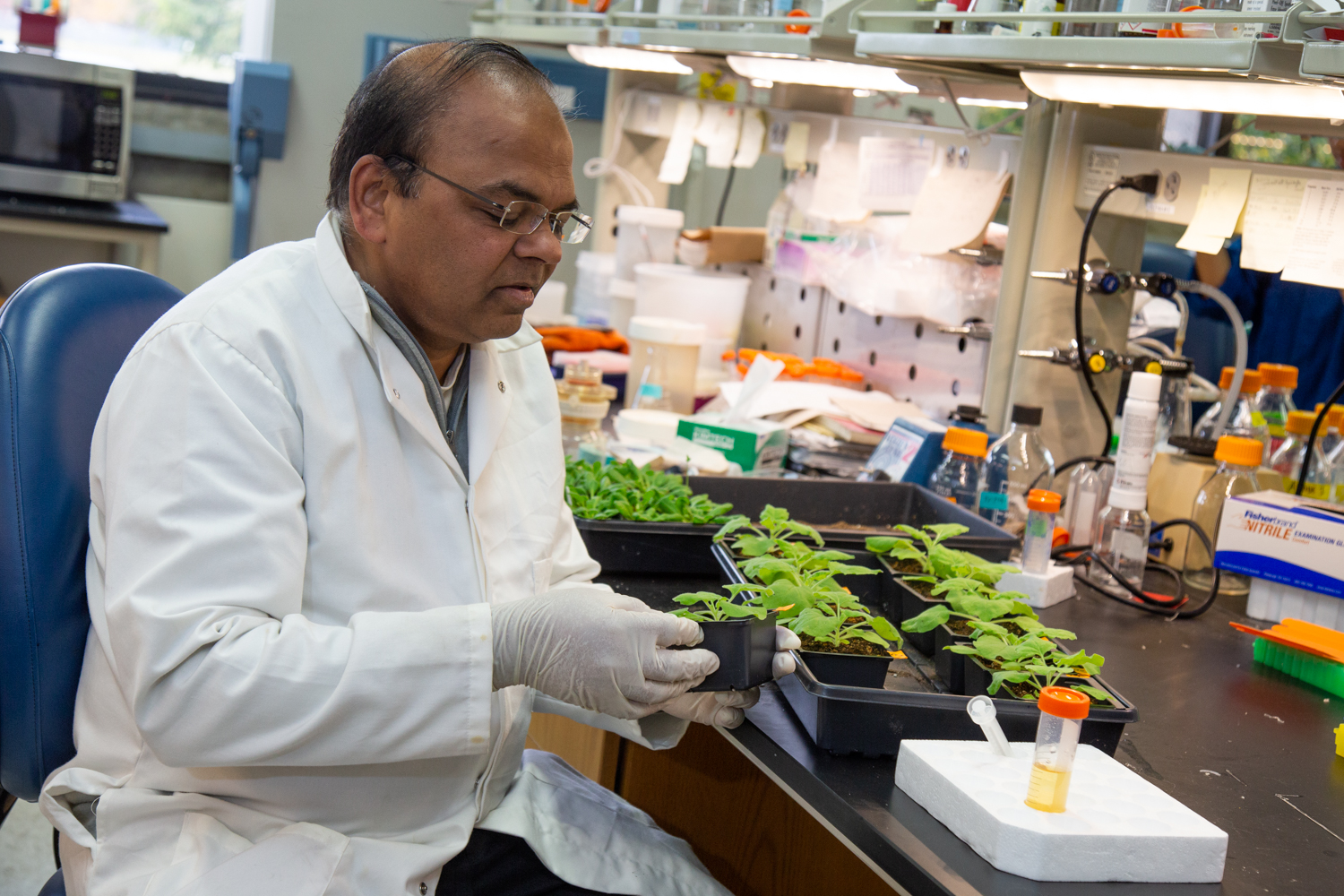
Discovering Curiosity: Tilling the Fields of Plant Molecular Biology with Professor Savithramma Dinesh-Kumar
Quick Summary
- For his excellence in research, Dinesh-Kumar has received the American Phytopathological Society's Noel T. Keen Award
- His interest in plants goes back to his youth working with his father on his family's farm in India
- His well-published research focuses on host-microbe interactions and plant defense tactics
Professor Savithramma Dinesh-Kumar, Department of Plant Biology, grew up in Bhadravathi, India. As a kid, he routinely spent time with his father, a high school teacher, on their farm in a nearby village. They grew rice and sugarcane, harvesting the latter crop by night when its sugar content was optimal.
“Since I was on the farm, I was always interested in plants, especially why farmers grow so many varieties of rice,” said Dinesh-Kumar.
But when it came time for university, Dinesh-Kumar initially decided to study engineering. While good at mathematics, he found the work too abstract. It wasn’t tangible, like the soil and crops in the farm fields of his youth. So Dinesh-Kumar took a different route and enrolled at the University of Agricultural Sciences in Bangalore, India. He started studying genetics, which eventually opened doors to research on plant breeding and plant-pathogen interactions. A storied career followed.
Dinesh-Kumar has published more than 100 research papers and reviews and has received many accolades, including being named a fellow of the American Association for the Advancement of Science in 2018. And now, he can add another honor to the list.
For his excellence in molecular plant pathology research, Dinesh-Kumar recently received the Noel T. Keen Award from The American Phytopathological Society.
“This is a great honor,” said Dinesh-Kumar, who expressed gratitude for the nomination. “I was not expecting this at all actually because Noel Keen is one of the pioneers in the plant pathology field.”
“Professor Dinesh-Kumar’s work on host-microbe interactions has helped reveal the fascinating molecular world of plant defense tactics,” said Mark Winey, dean of the College of Biological Sciences. “His continuing research and insights have had significant impact on the field and demonstrate the strength of our stellar Department of Plant Biology.”

On the front lines of plant defense
After completing a master’s degree in Genetics, Dinesh-Kumar traveled half a world away to the United States. His first stop was the University of Kentucky, where he secured a graduate research position in the Department of Forestry and Natural Resources. There, he worked on a project concerning fungal resistance in poplar trees. Though he enjoyed the work, Dinesh-Kumar wanted to try his hand at molecular biology.
“I always had my mind on molecular biology back when I was a master’s student,” said Dinesh-Kumar. “I had a lot of theoretical exposure but not any hands-on experience.”
One day, he saw an announcement for a three-week intensive molecular biology training program at the The University of Chicago’s Marine Biological Laboratory, Woods Hole, Mass. It was the perfect opportunity to indulge his molecular biology curiosity. The program solidified Dinesh-Kumar’s sentiment that molecular biology is fundamental to answering basic questions about plant defense tactics.
Inspired, Dinesh-Kumar enrolled in a Molecular, Cellular and Developmental Biology Ph.D. program at Iowa State University and joined the lab of W. Allen Miller, a professor of plant pathology and microbiology.
Dinesh-Kumar’s dissertation explored the barley yellow dwarf virus (BYDV), which affects cereal crops. His research revealed that the virus uses leaky scanning and translational read-through strategies to produce three different proteins from a single subgenomic RNA.
“My goal was to figure out what sequences in the viral RNA are responsible for making these multi-pronged proteins from a single RNA,” said Dinesh-Kumar, who also constructed the first successful infectious clone of BYDV.
Following graduation, Dinesh-Kumar headed further west and joined Professor Barbara Baker’s laboratory at the UC Berkeley Plant Gene Expression Center. He continued studying viral resistance and became part of the team that cloned the first virus resistance gene “that confers resistance to the tobacco mosaic virus,” according to The American Phytopathological Society. The team identified the first plant resistance protein that contained Toll-Interleukin-1 receptor (TIR) homology domain. The work was foundational for the field, and today, these receptors are known to be integral to not only plant immunity but animal immunity as well.
“In the last 20 years, the thrust has been to understand how these immune receptors recognize pathogens and how they activate signal transduction in the plant so the ultimate output is resistance,” said Dinesh-Kumar. “We still don’t have a complete understanding of how these resistance proteins are working.”

Containing plant infections
Dinesh-Kumar joined the UC Davis faculty in 2010 following a roughly 10-year stint at Yale University. Today, he’s the chair of the Department of Plant Biology and also holds an appointment with the UC Davis Genome Center. His research focus is still on understanding the molecular basis of host-microbe interactions.
“One of the area we’re interested in recently is, how do chloroplasts actually contribute to plant resistance?” said Dinesh-Kumar, noting that chloroplasts produce reactive oxygen species and the salicylic acid hormone. Both are important players in plant defense.
What’s more, Dinesh-Kumar and colleagues found that chloroplasts coordinate with the cell’s nucleus to instigate and execute plant defense responses. These actions are incredibly exact. When a plant is infected with a pathogen, its immune receptors activate a cascade of responses leading to cell death that keep the pathogen contained. Dinesh-Kumar and colleagues found that plant cells activate autophagy to keep cell death localized to the infection site.
“The idea is that if it contains the pathogen at the infection side, the rest of the plant can be free from the pathogen and it will not be able to spread,” said Dinesh-Kumar.
It’s a cellular sacrifice that benefits the whole organism.
“The question the field is interested in is, what causes this cell death and how immune receptors activate this process?” he added. “Why is cell death only occurring in a few cells but not spreading?”
The ultimate goal—after figuring out how these biochemicals and organelles work in tandem with one another—is to engineer plant proteins that confer broad-spectrum resistance to a suite of pathogens. Dinesh-Kumar and his team are working hard to identify and further describe the molecules involved in plant defense.
“We are optimistic that our research on mechanistic understanding of how immune receptors function could pave the way towards engineering durable resistance against pathogens in important crop plants,” said Dinesh-Kumar.
Dinesh-Kumar will receive the Noel T. Keen Award at The American Phytopathological Society annual meeting in August.
